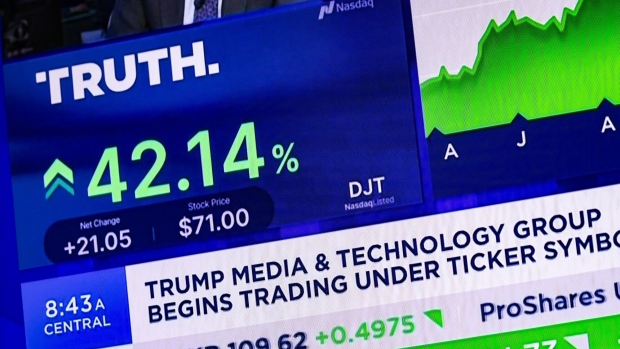Apr 23, 2024
Trump Set for Another $1.3 Billion in Shares He Can’t Sell Yet
, Bloomberg News

(Bloomberg) -- The blank-check deal that brought Donald Trump’s media startup public is set to give him another $1.2 billion in stock after meeting certain targets to his present windfall from the merger, yet he remains unable to cash any of it in.
With shares of Trump Media & Technology Group Corp. regaining steam last week, the former president and insiders are set to receive 40 million shares to split after fulfilling terms related to a so-called earnout.
With 36 million of the additional shares earmarked for Trump — which would bring his total position to nearly 115 million shares and bump his holdings to roughly 65% — his stake in the Truth Social parent would be worth $3.7 billion after the shares slumped more than 8% to $32.57 Tuesday. Despite the declines, the stock held well above the $17.50 mark over a stretch of 20 days to meet the parameters of the deal.
Not only does the figure mark a steep decline from the $6.3 billion Trump’s original position was worth in the days after the company debuted, it draws into sharp relief the fact that even as Trump and other insiders’ paper wealth grows, they are currently unable to sell any shares until September due to a lock-up related to the deal.
The former president could gain board approval to start selling stock more quickly once an April 15 filing is deemed effective by the US Securities and Exchange Commission.
Read More: Trump Mastered The Art of the SPAC Deal. Cashing Out Is Harder
The sweeteners are a common part of special purpose acquisition company deals and are designed to reward investors, while diluting the value of ordinary shareholders’ stakes through the issuance of millions of extra shares.
Attracting Traders
Even with the overhang of the dilution, Trump Media has attracted meme-stock traders and Wall Street professionals alike. This year alone has seen shares swing between $16.90 and $79.38 with a current market valuation of roughly $4.5 billion, even though the underlying business generated only modest revenue last year.
The stock’s volatility prompted its chief executive officer to suggest an illegal form of short selling could be impacting its stock and asked Nasdaq Inc. to step in. “This is particularly troubling given that ‘naked’ short selling often entails sophisticated market participants profiting at the expense of retail investors,” Trump Media CEO Devin Nunes said in the letter.
Read More: Trump Media Suggests Illegal Shorts Are Cratering Its Stock
Trump Media is one of the most expensive in the market to short with investors facing annual financing costs of some 225%, according to data from S3 Partners.
One driver of the lofty fees is the difficulty of borrowing shares to sell them, on account of there being a small pool of shares available to trade. That’s partly because of the stock’s retail trader investor base, and also because companies that go public through SPAC deals normally don’t have long-oriented shareholders like mutual funds, and ETF providers — the usual source of shares available for lending.
The volatility in Trump Media’s shares comes as Trump is obligated to pay significant financial penalties as a result of having been found liable for sexual abuse, defamation and rampant financial fraud tied to his asset valuations. He faces four more prosecutions; his first criminal trial, over charges he falsified business records to conceal a hush money payment to a porn actress before the 2016 election, is underway in Manhattan. Trump denies wrongdoing in all the cases and claims, without evidence, that Biden is directing the legal onslaught against him.
Earnouts and Warrants
While the earnout would dilute current investors because there are more shares created to give to insiders, there’s a risk of even more shares being added to those outstanding, from warrants tied to the deal.
The warrants, which closed at $14.70, were sold as part of the SPAC’s initial pitch to investors and can be exchanged along with $11.50 in cash for shares of the company. There are more than 14 million of the sweeteners in the market, which could add cash to Trump Media’s balance sheet but hit the investors who own the common stock.
An important metric for investors eying a potential arbitrage is the difference between buying a single share outright, versus the cost of buying a warrant and the cash needed to exchange it for a share. That spread has narrowed to $6.36 from a March high of $27.27.
The gap has shrunk as investors grapple with the lackluster fundamentals of Trump Media and expectations that after the SEC deems the April filing effective investors would be closer to swapping the warrants for shares.
In practice, an arbitrageur could buy the warrants and short the common stock until the values converge — adjusted for the fees tied to borrowing the shares. However, given the costs and difficulty of borrowing shares and the stock’s volatile nature, the trade is simpler in theory than in practice.
(Updates share.)
©2024 Bloomberg L.P.






